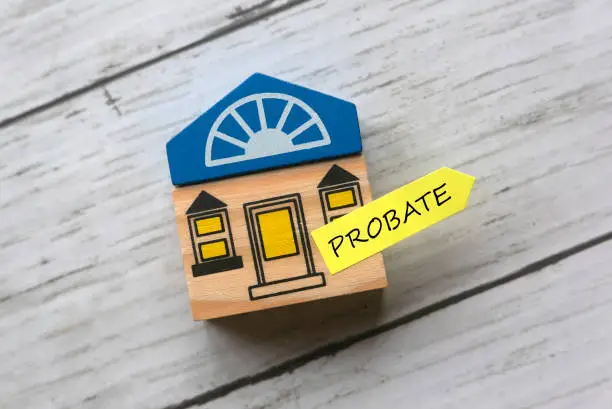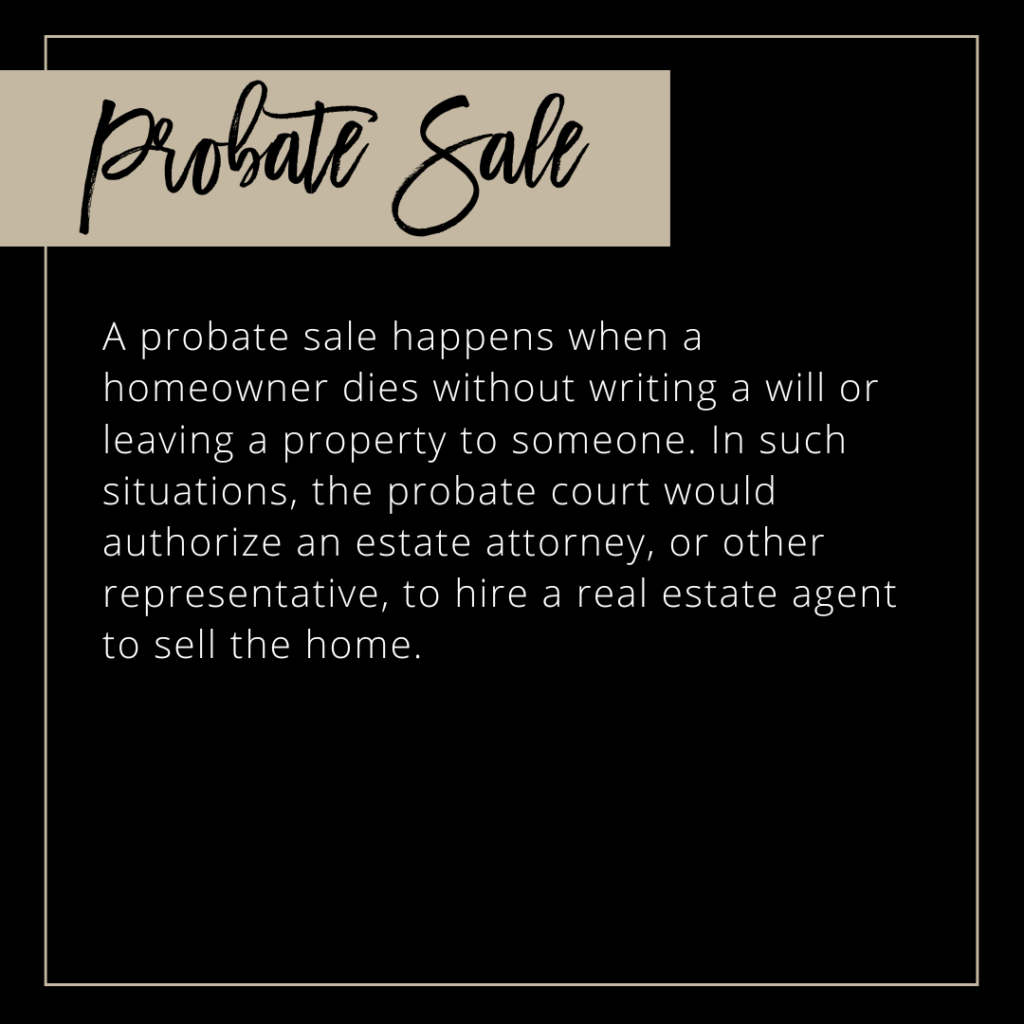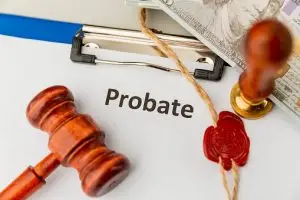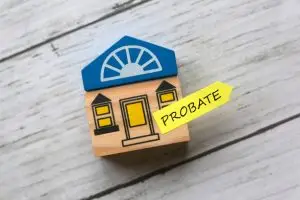What is a Probate Sale

Hello, readers! Welcome back to my blog. Today, we have an intriguing topic to discuss – probate sales. Whether you’re a first-time homebuyer or an experienced investor, understanding the concept of probate sales is essential. In this article, we’ll dive deep into what probate sales are, how they work, and why they can be an excellent opportunity for buyers.
Additionally, a probate sale is a court-supervised process for selling real estate belonging to a deceased person’s estate. This type of sale occurs when someone dies without a valid will specifying how their property should be distributed, or when the terms of the will are unclear. So, let’s get started!
What is a Probate Sale?

For example, probate sales occur when a property is sold after the owner’s death, and the court oversees the process to ensure a fair and legal distribution of assets. In simpler terms, it’s a way of selling a property that belonged to a deceased person. These sales typically happen when the deceased person did not leave a will or trust, or if their estate is going through the probate process.
How Do Probate Sales Work?
When a property goes into probate, the court appoints an executor or administrator to handle the estate’s affairs. The executor’s primary responsibility is to sell the property to settle any outstanding debts and distribute the remaining proceeds to the rightful heirs. The sale is usually facilitated through a real estate agent or broker, just like a regular home sale.
Key Aspects of Probate Sales
Court Oversight:
The probate court oversees the entire sale process to ensure it is conducted fairly and transparently.
Estate Administrator:
The court appoints an administrator or executor to manage the sale of the property on behalf of the estate.
Property Valuation:
An appraisal is typically required to determine the property’s fair market value.
Listing and Marketing:
A real estate agent with experience in probate sales is often who you hire to list and market the property.
Offer Process:
Potential buyers submit offers, which must usually include a 10% deposit.
Court Approval:
The final sale must get approval by the probate court, often through a confirmation hearing.
Reasons for Probate Sales
Probate sales may be necessary for several reasons:
First, to pay off the deceased person’s debts and taxes.
Second, to distribute the proceeds among heirs or beneficiaries.
Third, to liquidate assets when there is no clear inheritor.
Benefits of Probate Sales
Potential for Below Market Value Deals:
One significant advantage of probate sales is that they often present opportunities to purchase properties at below market value. This is because the heirs or the estate administrators are motivated to sell the property quickly to settle the estate. As a result, buyers can sometimes find great deals and secure properties at a lower price compared to traditional sales.
Less Competition:
Probate sales can have less competition than other types of real estate transactions. Many buyers may not be aware of these opportunities or may hesitate due to misconceptions or lack of understanding. This reduced competition can give you an edge as a buyer and increase your chances of acquiring a desirable property.
Flexible Negotiation:
Since the heirs or estate administrators are usually motivated to sell quickly, they may be more open to negotiations. This flexibility can potentially allow buyers to negotiate favorable terms, such as repairs, closing costs, or even a lower price. However, it’s important to approach negotiations respectfully and professionally.
What is a Probate Sale: What You Need to Know
Probate is when a person’s estate is distributed after they die. In most cases, the person who dies must have a will in order for their estate to be formally and legally distributed. If you don’t have a will, your estate will be administered under the rules of intestacy. This means that all of your property will go to your closest relatives automatically. However, if you do have a will in place, probate law says that any property you own should be sold in order to pay estate taxes and other debts associated with your final payment. This guide outlines everything you need to know about probate sales — from what they are and how they work, to whom they affect, who can sell assets during probate and why it’s important to get a lawyer if you plan on having one represent you during your probate sale.
What is a Probate Sale?
Simply put, a probate sale is when a trust or other fiduciary sells assets during the course of probate administration. This is the period of time between when a person dies and when their heirs receive their entire inheritance. During this period, the person who wants to sell assets during probate — the fiduciary — must petition the court. The court must approve them and they must give notice to the people and businesses that the assets belong to. Once they give the notice and the court approves the fiduciary, they can sell the assets.
Why Does Someone Have to Sell Assets during Probate?
The estate must pay off significant debt that the person who dies often has. The person who owns the assets during probate may want to pay off a particular bill to keep the IRS from taking their entire payment. Or, the person who dies may have substantial business debts, like a significant amount of unpaid taxes owed the government or a large, unpaid debt. In order to pay off these debts, the person who wants to sell assets during probate may need to sell assets to pay off creditors. This is also a common method of probate funding. If the person who dies owns a business, for instance, and has substantial debts to the business and its suppliers, they may need to sell the business’ assets in order to pay the debt.
Who Can Sell Assets During Probate?
A probate sale can only be made by a fiduciary; like the executor of a will or the trustee of a trust. A fiduciary is a person appointed to manage another person’s assets. Depending on the situation, a probate fiduciary might be the executor of a will, the trustee of a trust, a personal representative (like a power of attorney or a representative payee), a successor trustee, a judge or a surrogate. A fiduciary can sell assets for the benefit of the person’s estate. This includes selling assets in order to pay off creditors and making final distributions to the person’s beneficiaries. A fiduciary can also sell assets in order to settle the estate’s debts.
How Does a Probate Sale Work?
If a fiduciary wants to sell assets during probate, they must file a petition with the court. They also must give notice to the people and businesses whose assets they want to sell. The fiduciary must file the petition with the court, explain the situation and request that the court allow the sale. The court will decide whether to allow the sale to take place. In many cases, the fiduciary files a petition with the court and then waits for an order allowing them to sell assets. This time, they are requesting permission to sell the assets. Then, the court expects the fiduciary to sell the assets. The court may give the fiduciary a time period within which to complete the sale, like 24 hours or one day. Then the court will assume that the fiduciary sold the assets.
The Benefits of Probate Sales
There are a number of reasons why someone selling assets during probate is a good idea. First, selling assets during probate can help you pay off your debts. That’s because you may be able to sell assets that are worth less than the amount you owe on them. This may result in a smaller payment to your creditors. One of the biggest benefits of selling assets during probate is that it allows you to pay off your debts quickly. As long as you have enough assets in your estate to cover them and you file the appropriate paperwork with the court, you can sell assets during probate much more quickly than if you were waiting for the final settlement of your estate.
The Disadvantages of Probate Sales
There are, of course, disadvantages to selling assets during probate. The biggest one is that it can take a significant amount of time. If a person doesn’t have a will, their property will automatically go to their closest relatives. This can take years to complete and involve a lot of legal paperwork. Another disadvantage is that it costs money in the form of attorney’s fees and court fees. If you are selling assets during probate; you must pay the court and an attorney to file the necessary paperwork and to appear at the sale.
Conclusion
Probate is the process that occurs when someone dies without a will. During probate, your fiduciary — the person who is in charge of your estate during this time — can sell assets to pay off your creditors. The biggest advantage of a probate sale is that it allows you to pay off your debts quickly. The biggest disadvantage of a probate sale is that it can take a significant amount of time, be expensive and include a lot of paperwork.
Differences from Traditional Sales
Probate sales differ from regular real estate transactions in several ways:
Longer Timeline:
The process can take several months to over a year due to court involvement.
As-Is Condition:
Buyers typically purchase properties in their current condition without repairs or renovations.
Public Bidding:
Some jurisdictions allow public bidding at the court confirmation hearing.
Price Restrictions:
In some states, the final sale price must be at least a certain percentage of the appraised value.
For buyers, probate sales can present opportunities to purchase properties at competitive prices, but they should prepare for a more complex and lengthy process compared to traditional real estate transactions.
Tips for Buying a Probate Property
Get Professional Assistance:
Working with a real estate agent experienced in probate sales is crucial. They can guide you through the process, help you navigate any legal complexities, and ensure a smooth transaction.
Do Your Due Diligence:
Before making an offer, conduct thorough research on the property’s title, liens, and any potential issues. It’s advisable to hire a professional home inspector to assess the property’s condition to avoid any surprises later.
Understand the Timeline:

What is a Probate Sale | Conclusion
In conclusion, probate sales offer unique opportunities for buyers to acquire properties at potentially lower prices. However, it’s crucial to understand the process, seek professional guidance, and conduct thorough due diligence. If you’re considering a probate sale, reach out to an experienced real estate agent who can assist you in navigating this specialized market. Happy house hunting!
Furthermore, remember to always consult with professionals in the field to ensure the accuracy and suitability of the information provided.

Contact Information
To schedule a coffee date or learn more about what is a probate sale, contact Terra Point Realty at 713-766-1697. Their friendly and knowledgeable team is ready to assist you with understanding what is a probate sale. Don’t miss out on the opportunity to live in your dream house – schedule a coffee date today and start your journey towards understanding what is a probate sale.


